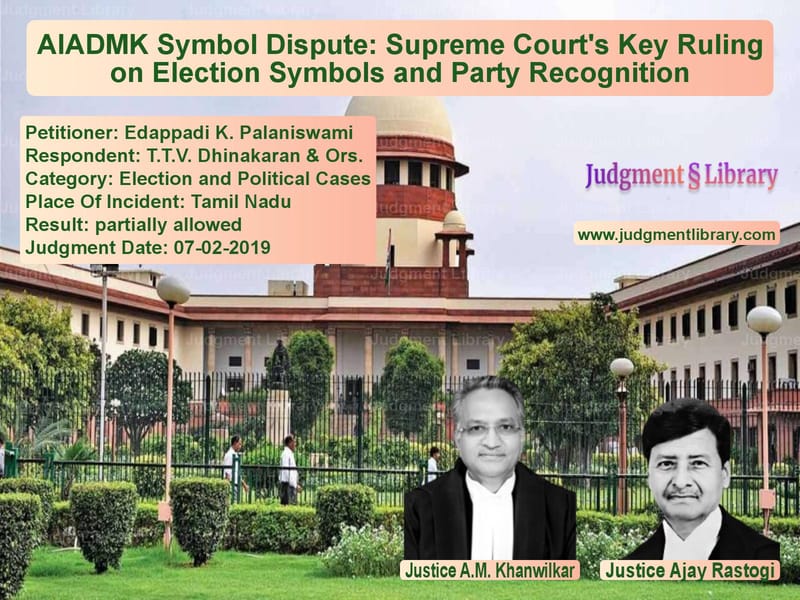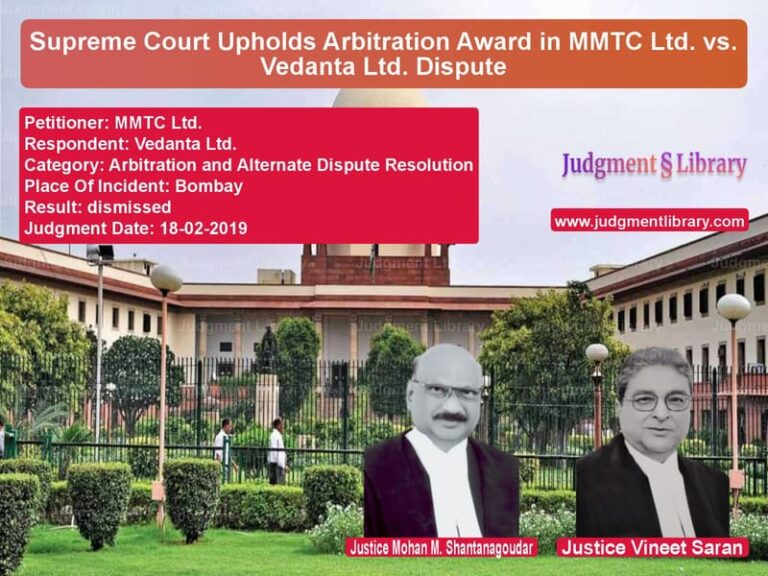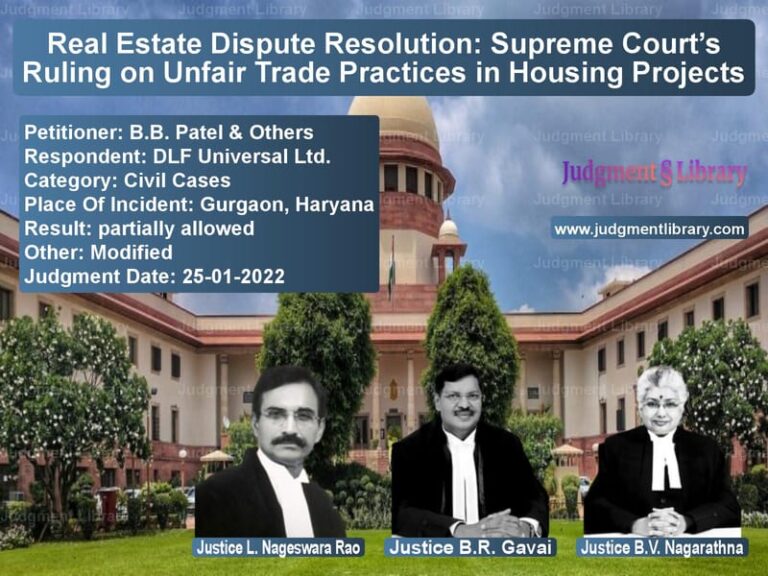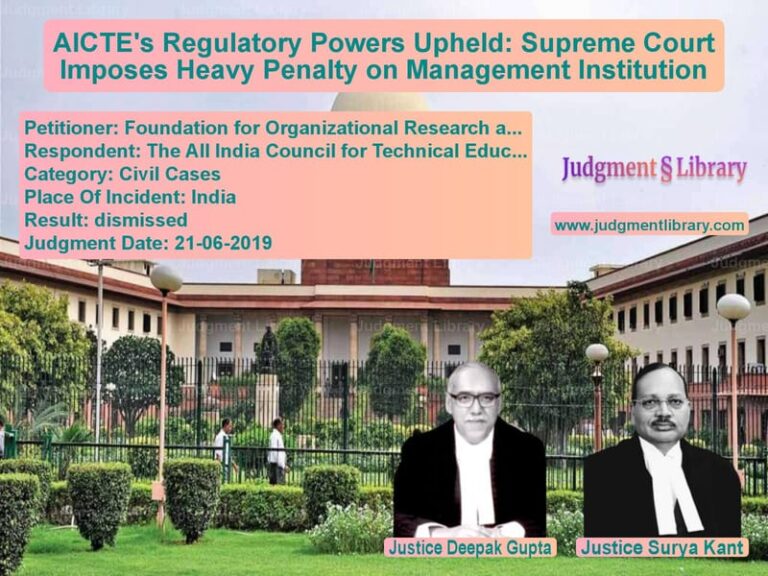AIADMK Symbol Dispute: Supreme Court’s Key Ruling on Election Symbols and Party Recognition
The Supreme Court of India recently delivered a significant ruling in the case involving the dispute over the AIADMK party’s name and the reserved election symbol ‘Two Leaves.’ The case was a high-profile political battle between Edappadi K. Palaniswami (EKP) and T.T.V. Dhinakaran (TTVD), with both factions claiming to be the legitimate AIADMK party.
The case originated from a challenge to the Election Commission of India’s (ECI) decision dated November 23, 2017, which recognized the group led by E. Madhusudhanan, O. Pannerselvam, and EKP as the rightful AIADMK and granted them the ‘Two Leaves’ symbol. TTVD and V.K. Sasikala (VKS) had contested this decision before the Delhi High Court, which issued an interim order in their favor on March 9, 2018.
Arguments Presented by the Petitioner and Respondent
Petitioner’s Arguments (Edappadi K. Palaniswami)
- The Election Commission had already adjudicated the dispute and allocated the AIADMK name and ‘Two Leaves’ symbol to EKP’s group.
- Granting an interim relief to TTVD’s faction allowing them to use a common symbol (Pressure Cooker) would create confusion among voters and weaken the AIADMK’s political standing.
- The interim relief granted by the High Court was in violation of the Election Symbols (Reservation and Allotment) Order, 1968, which mandates that only registered and recognized parties can use reserved symbols.
- Allowing an unrecognized group to use a common symbol would undermine the integrity of the electoral process.
Respondent’s Arguments (T.T.V. Dhinakaran)
- TTVD’s faction had substantial legislative support when the dispute first arose, with the backing of 122 MLAs and 37 MPs at the time of filing their challenge before the ECI.
- The Election Commission had previously allowed similar interim arrangements in cases involving Rashtriya Janata Dal, Kerala Congress, and Uttarakhand Kranti Dal.
- Without a common symbol, the TTVD-led faction would be at a severe electoral disadvantage, preventing fair competition.
- The High Court had correctly exercised its jurisdiction in granting interim relief to ensure a level playing field.
Supreme Court’s Ruling and Key Observations
The Supreme Court, after reviewing the arguments and past precedents, ruled in favor of TTVD’s faction, allowing the Election Commission to process their request for a common symbol and party name. The Court observed:
“The High Court was justified in granting interim relief to the petitioners. If the Election Commission could grant a similar interim relief while the dispute was pending before it, there is no reason why the High Court cannot do so during the pendency of the writ petition.”
Further, the Court rejected the preliminary objection raised by EKP’s faction, which claimed that the Supreme Court was functus officio (lacking further authority) after disposing of the initial Special Leave Petition (SLP). The Court held:
“The liberty granted by this Court in its order dated March 28, 2018, allowed the parties to approach the Court if any fresh election notification was issued. The present Miscellaneous Application was filed accordingly and is maintainable.”
Impact of the Judgment
The ruling has far-reaching implications on the recognition of political parties and allocation of election symbols. It establishes the following key principles:
- The Election Commission has broad discretionary powers to grant interim relief in election disputes.
- The High Court can issue interim orders to ensure a level playing field for competing factions.
- Election symbols play a crucial role in democratic processes, and denying a faction a common symbol can unfairly disadvantage them.
- Courts can intervene even after a final order if necessary to ensure fair elections.
Ultimately, the Supreme Court’s decision upheld the High Court’s ruling, ensuring that TTVD’s faction could contest upcoming elections with a recognizable name and symbol. The judgment reinforces the principle of free and fair elections while maintaining judicial oversight over electoral disputes.
Petitioner Name: Edappadi K. Palaniswami.Respondent Name: T.T.V. Dhinakaran & Ors..Judgment By: Justice A.M. Khanwilkar, Justice Ajay Rastogi.Place Of Incident: Tamil Nadu.Judgment Date: 07-02-2019.
Don’t miss out on the full details! Download the complete judgment in PDF format below and gain valuable insights instantly!
Download Judgment: Edappadi K. Palanisw vs T.T.V. Dhinakaran & Supreme Court of India Judgment Dated 07-02-2019.pdf
Direct Downlaod Judgment: Direct downlaod this Judgment
See all petitions in Fundamental Rights
See all petitions in Constitution Interpretation
See all petitions in Legislative Powers
See all petitions in Public Interest Litigation
See all petitions in Judgment by A M Khanwilkar
See all petitions in Judgment by Ajay Rastogi
See all petitions in partially allowed
See all petitions in supreme court of India judgments February 2019
See all petitions in 2019 judgments
See all posts in Election and Political Cases Category
See all allowed petitions in Election and Political Cases Category
See all Dismissed petitions in Election and Political Cases Category
See all partially allowed petitions in Election and Political Cases Category







